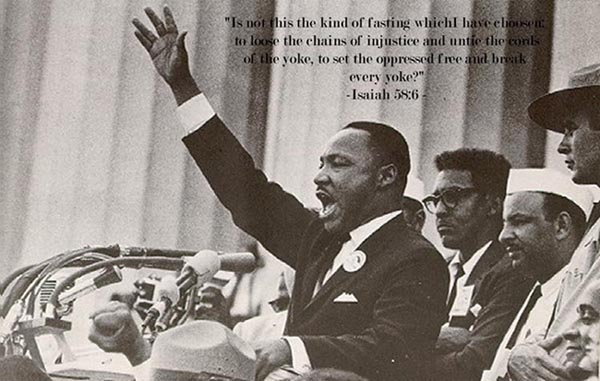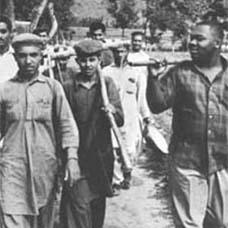
King's '67 anti-war speech made him a statesman
King's '67 anti-war speech made him a statesman
Expanding his legacy beyond bus boycott, 'I have a dream,' he set precedent for black Americans to be recognized as more than racial justice advocates
By Kelly Brewington
Sun Staff
Originally published January 17, 2005
He called it a speech to break the silence. And it created an uproar.
On April 4, 1967, before 3,000 people at New York's Riverside Church, the Rev. Martin Luther King Jr. denounced the Vietnam War as an "enemy of the poor" and criticized the U.S. government as the "greatest purveyor of violence in the world."
President Lyndon B. Johnson was enraged. And until King's assassination exactly a year later, his popularity waned.
But the "Beyond Vietnam" speech had a lasting impact. Scholars and peace activists call King's words as relevant to today's war in Iraq as they were nearly four decades ago.
What's more, in protesting the Vietnam War, King became the most prominent black American to criticize U.S. policies beyond civil rights. He forced the world to view his legacy beyond the Montgomery bus boycott and the "I Have a Dream" sound bite, while setting a precedent for black Americans to be recognized as more than advocates for racial justice.
"The whole notion of black Americans having a major say on foreign policy is just something that would not have been conceivable," said Clayborne Carson, a history professor and director of the Martin Luther King Jr. Papers Project at Stanford University. "Diplomacy was something that was done by elitist white guys from Yale."
Today, on the holiday in observance of his birthday - he would have been 76 - peace protesters, scholars and civil rights activists are urging the nation to embrace the complexities of King. They remember King the advocate for the poor and King the foreign policy critic whose for voice for peace still reverberates 37 years after his death.
"When I go to other countries, it's very clear that he was more than a black civil rights leader," Carson said. "But in the U.S. he's been perceived as just a black leader."
This year, in addition to annual interfaith services, anti-violence discussions and civil rights leaders' remembrances, peace groups throughout the area are using the holiday to draw attention to the war in Iraq.
In Washington, a handful of protests and activities planned during President Bush's inauguration are centered around King's antiwar legacy.
"We feel like if he were alive today, he would be championing peace and would be very vehemently against this invasion in Iraq," said Holly Stadtler, an organizer of Finding Our Voices Coalition. The coalition is sponsoring a rally and cultural festival that includes groups such as Black Voices for Peace and CodePink: Women for Peace.
And at the National Cathedral in Washington, in addition to sermons and an annual youth discussion on nonviolence, an exhibit from the American Friends Service Committee will show the human cost of the war in Iraq.
Called "Eyes Wide Open," the exhibit is a simple display of more than 1,000 pairs of boots, representing the U.S. soldiers who have died in the conflict. Another several hundred pairs of shoes, will represent the thousands of Iraqi war dead.
"It makes perfect sense," said Greg Rixon, spokesman at the cathedral. "We could do this anytime, and it would be a moving and reflective message of nonviolence. But it's particularly poignant on this day, because we have a true American hero who devoted his entire life to a legacy of nonviolence."
For King, nonviolence was the means to social change on three fronts: militarism, racism and poverty.
"They are all connected," said the Rev. Graylan Hagler, a Baltimore native whose church, Plymouth Congressional United Church of Christ in Washington, will host a rally Friday to remember King's commitment to all three causes.
"The 'dream' is what the powers in this country feel that it is convenient to applaud. But it doesn't get to the place of critical analysis," said Hagler, a lifelong civil rights activist, who counts King as an inspiration. "There are other speeches that end up being a critique of America, and they are relevant because the same system exists right now."
Hagler, who once ran for mayor of Boston, has devoted his life to peace and protest, from Vietnam to South African apartheid. In grade school, he rallied his buddies to protest a developer's plan to turn the empty lot they had used as a baseball field in Northwest Baltimore into homes. King's antiwar stand had a profound effect on him, he said. Yet Hagler notes its complexities.
"It took King a while to get there," he said. "How could you speak about nonviolence at home when we are inflicting all this violence around the world? He began to see that what we do abroad is intricately linked to the status of our soul as a nation."
In fact, it took King years to speak out publicly against Vietnam, even though he was opposed to the war for a long time.
In 1965, he first urged a cease-fire in Vietnam during a speech at Howard University. But it would take two more years for him to make his first declaration of opposing the war during the speech at Riverside Church.
King knew he risked alienating supporters and losing the focus of his civil rights goals.
"It was less clear what he would gain," said Carson, the Stanford professor.
It wasn't just the civil rights agenda that was in jeopardy. Speaking out on anything other than civil rights was something that came with severe consequences for African-Americans, said Carson.
"When Paul Robeson and W.E.B. DuBois took a stand against the Cold War, it ruined their careers," said Carson. "For a black person to enter into a foreign policy issue, it could end your career or maybe put you in prison. King crossed a major threshold that most blacks couldn't do."
It may be a curious notion by today's standards, with African-Americans Colin L. Powell and Condoleezza Rice helping to set U.S. foreign policy. But at the time, King opened many doors, said Carson.
Before speaking out, King felt conflicted. His decision came only after prodding from his wife, Coretta Scott King, and others in the civil rights movement.
"In King's autobiography, he criticizes himself for taking a stand," said Carson. "Here was this person who had consistently denounced war but couldn't really speak out against this war."
However, King decided to voice his opposition after Johnson diverted money from anti- poverty programs to the war. King saw hypocrisy.
He said the war hurt poor people and pointed to the irony of race relations. Blacks and whites could fight along side each other in another corner of the world "for a nation that has been unable to seat them together in the same schools," Carson said.
And while King's statements caused the civil rights movement some harm - alienating the White House and some financial supporters of the Southern Christian Leadership Conference - they didn't ruin him, Carson said.
When King finally spoke out, he did so with a sense of relief, after years of being frustrated by his own indecision, Carson said.
"After that, he makes some of the most beautiful statements in the need of standing up for your conscience," he said. "He showed that taking a stand was extremely important."











